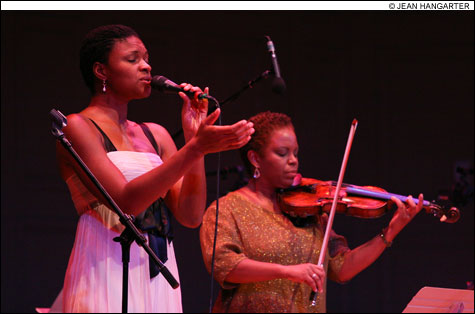"A Celebration of Jazz & Joyce," Symphony Hall, September 28, 2007
By JON GARELICK | October 2, 2007

Lizz Wright and Regina Carter |
All-star blowouts at Symphony Hall are fraught with risk. The hall is unfriendly to amplified music, and what happens if one of the all-star jams goes off the rails into some 27-chorus solo on “Flyin’ Home”? But “A Celebration of Jazz & Joyce,” produced by George Wein and his former top capo, Dan Melnick, was a tightly run affair. A fundraiser for a Berklee scholarship created in memory of George’s wife, Joyce Alexander Wein, the sold-out show came in at a cool three hours. Only George’s extended — and touching — thank yous after the final note was played pushed the event well into overtime.Better yet, the 18 musicians — arranged in different groupings — played full-out without overindulging. Tenor sax didn’t fare well — Lew Tabackin and Joe Lovano exerted themselves mightily to little effect amid drums, bass, and Symphony Hall reverb. Tabackin did far better alone with his flute — unamplified — on Django Reinhardt’s “Nuages.” Branford Marsalis sliced through the air on soprano in a duet with Joey Calderazzo on the pianist’s “Breeze Dance.” Then he showed Lovano how to deal on “Softly, As in a Morning Sunrise,” taking the tempo way down so his big rounded tenor notes carried. Lizz Wright, a powerhouse singer, was smart enough not to push her voice — accompanied by pianist Geri Allen, she just opened her mouth let the music pour out, conversationally, on “Here’s to Life” and “Reaching for the Moon.” Violinist Regina Carter brought her solo on Luiz Bonfá’s “Manhã de Carnaval” (from Orfeu negro|Black Orpheus) down to a whisper. Pianist Michel Camilo played unaccompanied, one song, his “Caribe,” which he said Joyce always requested. With his beautiful touch, command of harmony, and rooted Latin dance rhythms, he drew a direct line from Chopin to Jelly Roll Morton. He brought the house down. When Herbie Hancock later emerged, he had no choice but to underplay Camilo, pecking out a pop melody in a spontaneous improvisation — then the chords filled out, the harmonies became unhinged, and he drifted into the chromatic language of Ravel and Debussy. Another quiet high point.
 Related
Related:
Trane, Joyce Dee Dee, Sco, and more, Fathers and son, All them 88s!, More 
- Trane, Joyce Dee Dee, Sco, and more
The official kickoff to the season begins with the week of activities celebrating the 30th anniversary of the John Coltrane Memorial Concert.
- Fathers and son
It must be daunting to have Joshua Redman’s talent.
- All them 88s!
From free to funky, it sometimes seems like a golden age of jazz piano.
- Covering the bottom end - and the bottom line
The biggest news made by the Newport Jazz and Folk Festivals the past two weekends was that they happened at all.
- Autumn leaves
One of the great harbingers of fall jazz for the past seven years has been the Beantown Jazz Festival.
- Getting it live
Noah Preminger — bearded, shaggy-haired, 23 years old — plays tenor saxophone like a man at least twice his age while remaining completely of the moment.
- The natural
It’s getting late on a Tuesday night at Bob’s Southern Bistro in the South End and I’m searching my memory for the last time I’ve heard and seen what’s happening now: a jazz singalong .
- Breaking through
In the overall retail picture, jazz accounts for about three percent of sales, and a “hit” CD is anything that exceeds 10,000 copies.
- Swing, etc.
The music may suffer plenty of economic slings and arrows these days, but it's still full of thrills galore. As usual, it's looking outside of its orthodoxy for invigorating ideas. Here are titles you truly need.
- Listen up
It’s the first year a long time where I truly felt like I didn’t listen to enough music.
- Francisco Mela
The first tune,“John Ramsay” (named for theBoston drummer), begins with the maze of Lionel Loueke’s acoustic-guitar patterns.
- Less

 Topics
Topics:
Live Reviews
, Herbie Hancock, Branford Marsalis, Joey Calderazzo, More  , Herbie Hancock, Branford Marsalis, Joey Calderazzo, Joe Lovano, Ferdinand "Jelly Roll" Morton, Lizz Wright, Regina Carter, Lew Tabackin, Django Reinhardt, George Wein, Less
, Herbie Hancock, Branford Marsalis, Joey Calderazzo, Joe Lovano, Ferdinand "Jelly Roll" Morton, Lizz Wright, Regina Carter, Lew Tabackin, Django Reinhardt, George Wein, Less 